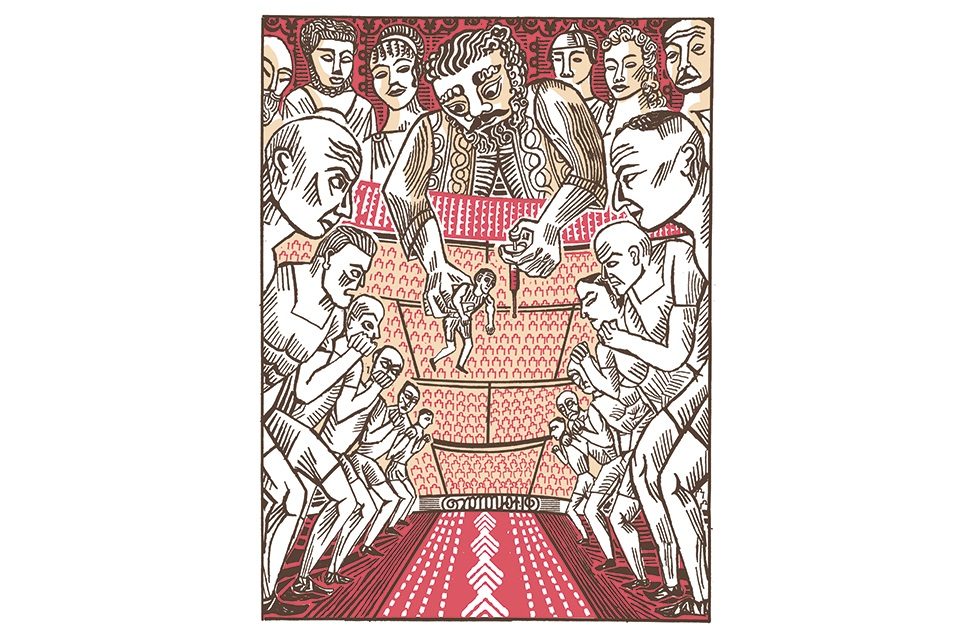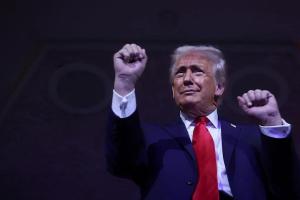Aron D’Souza likes to celebrate the new year with Peter Thiel, the venture capitalist billionaire who is good friends with Donald Trump and J.D. Vance. “Before Peter had kids, we’d go on these holidays around the world. Small group of us. Gay, tech, venture capital, founder-types,” says D’Souza, an Australian businessman. “It’s quite a close-knit little community.” Lately, because of the kids, they’ve partied at Thiel’s place, an $18 million compound on a man-made island off Miami’s turquoise coast. In December 2022, days before Thiel’s annual party, D’Souza came up with the idea of an “Enhanced Games.” The Olympics — but all the athletes dope.
“That’s what I do over Christmas, when no one else is working,” D’Souza says. “I focus on building a new institution.” He went to the party and told Thiel his idea. “He just said: ‘Oh, that’s very cool.’” In March this year D’Souza announced that Thiel had invested millions in the project. “Peter loves it, right?” D’Souza says. “He constantly sends me text messages and things.”
A list of acceptable drugs still needs to be agreed. A total free-for-all might risk athletes taking it too far
The first games will happen next year, D’Souza says at a bar at the Connaught Hotel in London. There’ll be no Olympic Park; no live audience. Instead, the event will be live-streamed from existing tracks and sport centers across the world because it’s cheaper. The roster of athletes is still to be announced, but James Magnussen, an Australian former Olympic swimmer, says he’ll be competing. “We’re going to announce the whole, basically, cast, at one time. So think of it like a media production,” D’Souza says. Aside from swimming, there will be athletics, gymnastics, weightlifting and combat sports. A list of acceptable drugs still needs to be agreed. A total free-for-all might risk athletes taking it too far and could prove fatal.
D’Souza gives the pitch. ‘The Enhanced Games is not about sports. It’s about ushering in a new era of mankind.” He calls it “a transition to superhumanity. Humans 2.0.” He says it’s important his drugged-up athletes break world records to prove one basic point: “People will finally believe biology is not our limit. Aging is a disease that we can treat, cure and eventually solve.” He is offering Magnussen $1.5 million if he beats the 160 feet freestyle record. Scientists have told him performance enhancers could improve all world records by around 5 percent.
Aging is a disease. Eliminating death has become a passion for a certain set of the super-rich. Amazon founder Jeff Bezos and Google co-founder Larry Page have invested ungodly sums in trying not to die. For a while, a millionaire called Bryan Johnson swapped blood with his seventeen-year-old son to try to slow his body clock. (“No benefits detected,” he reported.) It’s unclear where the trend for rich people trying to defy death originates, but Thiel once said his obsession began with a traumatic first encounter with mortality. Aged three, he asked his dad what happened to the cow that provided the family’s hide rug. “It was really disturbing,” he said.
D’Souza can’t properly explain where his interest in curing death comes from. He says things like: “Why should we be limited by our weak, feeble biological forms?” And: “Doesn’t every person dream of conquering mountains?” He speaks in unsatisfactory platitudes. “Humans have to progress,” he says at one point. “Because otherwise we’re going to… well… our civilization will just fade away completely. And I think that would be really unfortunate.” He’s oddly unconvincing about the cause.
“Tesla trades at 100 times what Ford does, because Tesla has a vision of the future, right?” D’Souza tells me. (He would love to be a peer of Elon Musk.) “We have a deep moral purpose to what we do and I carry it around in my wallet.” He picks out a plastic card with the “Mission Statement” of the Enhanced Games printed on it: “To build the definitive scientific, cultural and sporting movement that safely transitions mankind into a new superhumanity.” Every employee has one of these cards. “Vistaprint.com. 50p.” D’Souza says the mission statement motivates him and helps attract clever people to the company. Today, moral purpose entices talent. “They just don’t want to work at some bank where they make $1 million a year.”
No, that’s boring. He won’t admit that “curing death” is a shtick, but smart people want to do meaningful work, and it suits him to offer it. Employees who feel their job has purpose are more productive, cheaper. It’s a principle straight from Harvard Business Review. “Nine out of ten people are willing to earn less money to do more meaningful work,” experts in the “science of happiness” wrote for the magazine a few years ago. It’s no coincidence that many of today’s ultra-wealthy claim to be guided by some virtuous pursuit.
Back to the games. Months before the 2021 Tokyo Olympics, twenty-three Chinese swimmers tested positive for trimetazidine, a little pink pill that improves endurance. The Chinese said the athletes weren’t cheating and the Olympic authorities believed them. The swimmers were allowed to compete and won gold. We talk about the incident and D’Souza lays into the anti-doping agency. “Corrupt, corrupt, corrupt, corrupt,” he says. “You just let twenty-three Chinese swimmers dope to the hills, and you covered it up! Why? Because the Chinese government probably paid you off!”
Now he’s animated. D’Souza is delighted to go after the Olympics, largely for the hell of it. “It’s good to challenge these incumbent bureaucracies,” he says. “Any monopoly becomes stale and dysfunctional.”
The Enhanced Games are designed to wind up old-guard sporting bureaucrats. The website has a section about “How to Come Out as Enhanced” (“It can feel liberating to be authentic with family, friends and other enhanced athletes”) and criticizes “The Colonialist Origins” of the word “doping.” D’Souza is a capitalist who wants to be thought of as progressive.
Why is he doing this? Can’t he just enjoy his money, drinking in the Connaught, partying in Miami? “It would be improper not to use your God-given talents,” he says. He comes across as a ruthless, restless rich person. “There is a boredom about modern business. After a point in time, it was like, you made enough money.” It’s all a game. “This cuts across political lines so beautifully.” It’s checkmate.
This article was originally published in The Spectator’s UK magazine. Subscribe to the World edition here.


























Leave a Reply